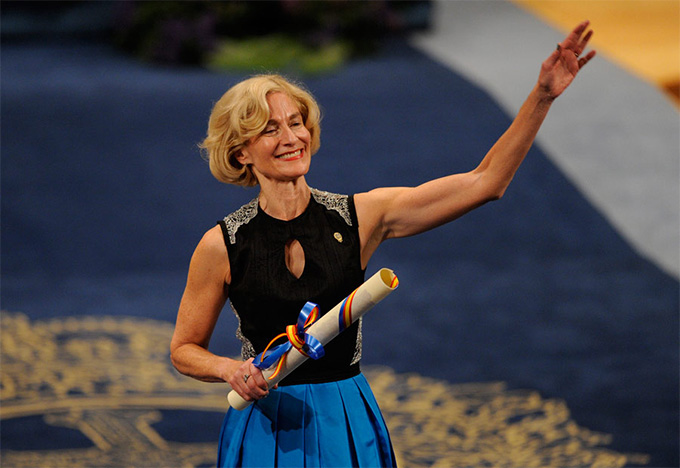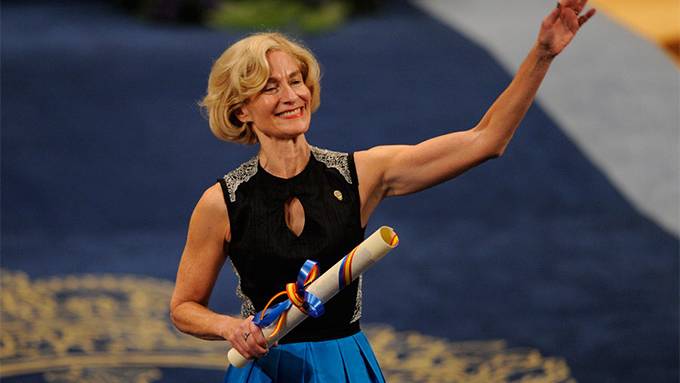Martha Nussbaum: Premier Citizen of the World
Source: eurocanadian.ca

The world of academia is full of hyper inflated academics with multiple titles, prizes, honors, publications, grants and "original" ideas. Martha Nussbaum, Ernst Freund Distinguished Service Professor of Law and Ethics at the University of Chicago, is a typical case in point; and since she is a woman, the accolades border on the preposterous. She has 50 honorary degrees from colleges and universities in North America, Europe, Africa and Asia. Among the many awards she has received are the "American Philosophical Society’s Henry M. Phillips Prize in Jurisprudence" and the "Prince of Asturias Award for Social Sciences." She has been honored multiple times including as Corresponding Fellow of the British Academy, Past President of the American Philosophical Association, and listed among the world’s Top 100 Intellectuals by The Prospect/Foreign Policy global poll in 2005, 2008, and 2010.
Martha’s Capabilities
Her great contribution to knowledge, apparently, has been a "capabilities approach" to development, which she originated together with economist Amartya Sen. The approach is actually very pedestrian and merely regurgitates the old Marxist idea that achieving the economic well being of all humans in the planet should be biggest priority in the pursuit of justice. She argues that humans need real opportunities in order to develop their "capabilities". Humans cannot live up to old age and develop their "capabilities" when they are deprived of food, political freedom, and religious tolerance. This is a variation on Friedrich Engels speech at the grave of Marx, "Mankind must first of all eat, drink, have shelter and clothing before it can pursuit politics, science, religion and art." The difference is that Nussbaum scavenges a few thoughts from Aristotle to argue that humans should be afforded with cultural opportunities together with economic means to develop their full capabilities. In short, Nussbaum is one more cultural Marxist in academe.
Combined with her "capabilities approach," her other original accomplishment has been the promotion of multiculturalism in Western societies and the idea of "a citizen of the world". Her driving motivation is that whites have a moral responsibility to develop the capabilities of all humans. She offers no policies about how to solve world poverty other than the same empty slogans leftists have bandied around for decades. But she is quite good moralizing about the subject and inflicting guilt on her whites students about their privileges, "ethical egoism," and antisemitism. She condemns the practice of female genital mutilation alright, but the moral onus is on white feminists to abolish this practice and thereby promote the capabilities of non-European females.
But if whites are held responsible with the task of raising the capabilities of all humans, they are not to be commended for their ethical lineage. Nussbaum, you see, was born into "the East Coast WASP elite" but converted to Judaism after her marriage to Alan Nussbaum. She later divorced in 1987, but had her bat mitzvah in 2008. In Judaism, she found a religion dedicated to justice in the world, a religion that teaches humans to feel the pain of others, not only of friends and family members, but also of those "on the other side of the world." In contrast, the WASP world she grew in was "very sterile, very preoccupied with money and status." In 2002, while visiting Israel, she commented,
I converted to Judaism at the age of 21, and I felt then, as I do now, that Judaism is above all a moral identity, connected to the love of justice. I felt that I was dedicating myself to a program of moral action aimed at realizing justice in the here-and-now rather than in some dim Christian afterlife--that, as Moses Mendelssohn once wrote, "The highest stage of wisdom is incontrovertibly doing that which is good." More viscerally, I felt I was leaving an elitist WASP culture that cared not one whit for social justice to join a liberal, socially alert Jewish family that read I.F. Stone and The Nation.
Nussbaum’s Take on the West
What Nussbaum found in Judaism was an ideological program for the reinterpretation of Western Civ in a cosmopolitan direction against European ethnocentrism and uniqueness. There are a number of ways in which the history of Western Civ has been misinterpreted, misused, and manipulated. Some in the European New Right blame Christianity for the current promotion of diversity and mass immigration, which I questioned here; still, the ENR has the proper attitude towards Europeans, and does not willfully seek to mislead anyone, but is sincerely trying to understand how we got into the current mess. Then we have the pathological leftists who hate the West or think it managed to "diverge" from Asia only as a result of "windfall gains" from the Americas. Then there are those who actually voice great admiration for Western Civ on the alleged grounds that this civilization mandates, from its very origins through to modern times, the promotion of race-mixing and mass immigration. They believe that the West engendered the universal values that are necessary for the creation of a race-mixed New World order, and they admire the West for this, but demonize Europeans who show loyalty to their ancestors and any form of ethnic affirmation. European ethno-nationalists, and only European ethno-nationalists, are seen as retrograde fascists on the "wrong side of history".
Nussbaum admires the West but calls her WASP father a "racist". In Judaism she encountered a morality that would allow her to bring out the multiculturalism she alleges is embedded in classic Western works, unappreciated by the radical leftists. When I first encountered Nussbaum’s work some 15 years ago, I interpret it as a sensible questioning of leftist excoriations of the West; only later did I start to see that her admiration was not for the ideas of Europeans but for ideas that she could manipulate to justify the promotion of a radical program of race mixing against any form of European ethnic identity.
Although Nussbaum is not a Neocon, she is a strong defender of certain "universal values" our establishment has come to identify with the Enlightenment. Her much talked about criticism of Judith Butler’s obscure writing style (not Butler’s radical constructionist claim that there are no natural differences between males and females), and her rejection of Jacques Derrida’s postmodernist denial of truth and objectivity seemingly placed her on the side of Western rationalism. She seemed to offer a fresh view against the influential postmodernist strain in academia:
What is deeply pernicious in today’s academy, then, is the tendency to dismiss the whole idea of pursuing truth and objectivity as if those aims could no longer guide us.... Postmodernists do not justify their more extreme conclusions with compelling arguments.... Derrida on truth is simply not worth studying for someone who has been studying Quine and Putnam and Davidson".
But as the reviewer who cited this passage points out, much as Martha Nussbaum eulogizes over the importance of an education in the classics, "she is an unscrupulous propagandist". She cleverly twists the ideas of classical philosophy to serve the contemporary ends of feminism, gay rights, racial integration, and mass immigration. Rather than making generalizations, here I will focus on one essay, Kant and Cosmopolitanism, published in a book, Perpetual Peace: Essay’s on Kant’s Cosmopolitan Ideal, commemorating the 200th anniversary of the publication of Kant’s essay Toward Perpetual Peace: A Philosophical Sketch (1795). This book contains essays by major luminaries such as Jurgen Habermas, Axel Honneth, Thomas McCarthy, and David Held. The argument of Nussbaum’s essay is that Kant was deeply influenced by Roman Stoic philosophy in his defense of a "politics based upon reason rather than patriotism or group sentiment".2 Seneca, Marcus Aurelius, and Cicero, she says, were the main intellectual sources behind Kant’s cosmopolitan citizen.
Read the rest at: eurocanadian.ca






















